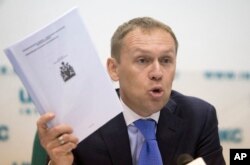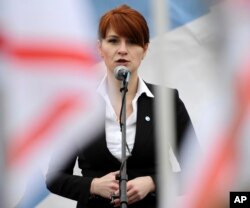The last time Britain accused two Russians of an assassination, one of them ended up in the Russian parliament.
The case of Andrei Lugovoi, a key suspect in the 2006 killing of ex-KGB officer Alexander Litvinenko, shows how the two alleged Russian military intelligence operatives accused by Britain of poisoning ex-Russian spy Sergei Skripal could have lucrative careers in Russia if they go public.
President Vladimir Putin said Wednesday the men - who British authorities said used the names Alexander Petrov and Ruslan Boshirov - appeared to be innocent. He suggested they tell their story “to some media outlet.”
Hours later, Russian state TV said it had spoken with Petrov and that he planned to comment on the case next week. Previous cases show that could be an improbable springboard into parliament or a network TV show.
When some Russians have been accused of crimes abroad, political and business leaders have embraced them and made them celebrities.
Andrei Lugovoi
Accused of poisoning Litvinenko with the radioactive substance polonium, Lugovoi, a former KGB officer, parlayed his newfound fame into a political career. In 2007, he was elected to parliament on the ticket of the nationalist LDPR party, which has strong Kremlin ties.
Since then, he's given his name to the Lugovoi Law - a 2014 measure allowing authorities to block “extremist” websites without a court ruling - and he's a regular commentator on the Skripal case for state TV.
Lugovoi argues Skripal's poisoning had nothing to do with Russia and blames Britain for harboring what he calls defectors.
“As long as you keep welcoming all kinds of scum on your territory, you're going to keep having problems,” he said in March on a popular talk shows.
The Russian constitution bans extraditing criminal suspects, and Lugovoi's status as a lawmaker makes him immune from prosecution at home. A fellow suspect, Dmitry Kovtun, has kept a lower profile.
Anna Chapman
When the FBI rounded up 10 Russian sleeper agents in 2010 and sent them home in a spy swap, one caught the eye of the tabloids.
The then-28-year-old Chapman, who was married to a British man, later launched a modeling career in Russia, and was briefly on the board of the youth arm of a pro-Putin political party.
She's best known, however, as the host of “Chapman's Secrets,” a long-running show mixing anti-U.S. rhetoric with conspiracy theories and mysticism.
“Why does official science still not concede that unidentified flying objects are alien spaceships?” she said one episode. “Our hypothesis that alien intelligence has long colluded with the ruling elite was recently and unexpectedly confirmed. What are politicians and soldiers keeping quiet about? I, Anna Chapman, will reveal this secret.”
More than 400 episodes have been made. Last week, guests speculated the U.S. was training Eastern European guerrillas to invade Russia, and another - introduced as a shaman - suggested intelligent trees caused hikers to go missing out of spite for humanity.
“It's incredible, but the living forest from the movie 'Avatar' isn't the director's make-believe,” Chapman summarized.
Maria Butina
Accused of working as an undeclared foreign agent in the U.S., Butina is fast becoming a cause celebre at home.
She was a relatively obscure gun-rights activist in Russia before she started making political contacts among Republicans and National Rifle Association members in the U.S. Now, Butina's photo is the avatar on the Russian Foreign Ministry's social media profiles.
Government rhetoric portrays her as a martyr to U.S. paranoia and a victim of poor conditions in the Washington, D.C., jail where she's being held pending trial.







